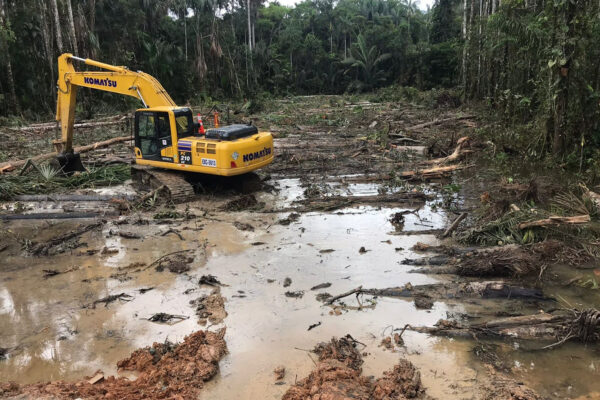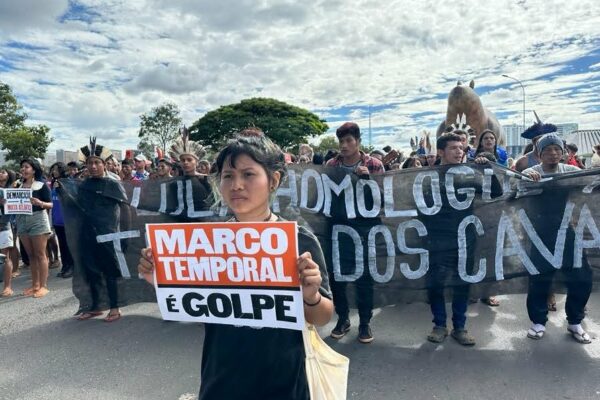29 January 2008
Executive Directors
International Finance Corporation
2120 Pennsylvania Avenue, NW
Washington, DC 20433
Regarding: IFC Financing for Camisea II / “Peru LNG”
From: Peruvian, Latin American, North American, and European non-governmental organizations
Dear Sirs –
Following meetings and communication with IFC management and project staff, we would like to emphasize our concern regarding IFC Board consideration of financing for the second phase of Peru’s Camisea gas project: Camisea II, or “Peru LNG.” This concern is based on: insufficient project due diligence, especially on the upstream component; the lack of a full economic cost-benefit analysis; and continuing social and environmental issues that demand resolution. These issues should be addressed prior to board consideration of the project.
IFC due diligence – environmental, social and economic – has been insufficient to date and should be adequately completed prior to Board consideration of the loan. We maintain our conviction, as detailed in our 30 August 2007 letter to Mr. Somit Varma, Director of the Oil, Gas, Mining and Chemicals Department, that the IFC must treat the first phase of the Camisea project and the expansion of the project in the second phase as an integrated system of associated facilities, requiring full compliance with all IFC Performance Standards. To do otherwise would set a very disturbing precedent with regards to the implementation of the IFC’s new Performance Standards and significantly harm the credibility of IFC’s environmental and social risk management framework. We have yet to see, for example, how the IFC demonstrates compliance with its “Broad Community Support” requirement, within the narrowly-defined transportation / export portion of the project, let alone for the upstream gas fields that supply the project.
Economically, we are skeptical of the promised benefits the exportation of LNG will have for Peru, as opposed to domestic use. According to a recent economic analysis of the Camisea II project, carried out by the economist Glenn P. Jenkins, founder of the Program on Investment Appraisal and Management at Harvard University, “It is questionable whether exporting any liquified natural gas is economically justified at this time. When the current and future needs of the country and the present level of proven reserves are considered, exporting liquified natural gas is likely to make Peru worse off than if it used the gas for its own use and to displace oil imports in the future.” (Environmental Defense commissioned this analysis in response to widespread public concerns among energy experts in Peru that Peru’s proven reserves are not sufficient to supply both rapidly growing domestic demand and the LNG export project for a sufficient number of years to make the export project economically beneficial.)
After the release of this study on December 17, 2007, the Peruvian government and petroleum companies in Peru began making announcements of massive new finds of gas reserves. But, to the best of our knowledge, these “announcements” do not reflect internationally certified proven reserves. The widespread opinion among technical and energy experts in Peru is that it is not prudent to proceed with an LNG export project – the largest investment in the country’s history – until net economic benefits can be demonstrated based on internationally certified proven reserves.
As far as we know, the IFC has not carried out a full economic appraisal of the economic costs and benefits of the project for Peru, which is disturbing for a project that is the largest investment of any kind in the country’s history and pivotal for the country’s energy security. As outlined in Professor Jenkins’ analysis, a commissioned study carried out by Apoyo Consultoria for the Inter-American Development Bank “highly exaggerates” the net benefits of the development of the Camisea II project. Moreover, serious questions have been raised about the circumstances under which the project’s governing laws and contracts have been changed to facilitate the export project.
Finally, there are a whole series of issues that continue to demand resolution, requiring additional time and good faith civil society engagement to adequately resolve. There are serious failures, risks, and concerns still pending from the first phase of the project and from new gas development in the Amazon that will feed the Peru LNG project. These include:
• A lack of fully independent monitoring (the Peru LNG consortium’s “Independent Advisory Panel” is not independent and falls far short of the IFC’s own best practice: the International Advisory Group for the Chad-Cameroon Pipeline Project);
• An inability to spend royalty revenues effectively, ongoing corruption investigations, and a Camisea Fund that was subverted from its original intent;
• Threats to isolated indigenous people living within the Kugapakori Nahua state reserve;
• Woefully inadequate respect for communities’ right to free, prior, and informed consent to this project;
• Significant impacts on local culture, human health, fisheries, and biodiversity that have not been adequately assessed much less addressed; and
• A recently released government audit which found that the pipelines were not designed to withstand the area’s harsh conditions, particularly in the Amazon, contributing to at least five pipeline incidents or spills.
In short, we remain skeptical of the economic benefit of Camisea II and are extremely concerned about the project’s on-going and future social and environmental impacts. We repeat our insistence that the IFC not approve additional funding at this time until the above issues are further considered and resolved, in conjunction with the participation of a broad range of stakeholders.
Sincerely,
Andrew Miller, Amazon Watch (USA)
Elena Gerebizza, Campagna per la Riforma della Banca Mondiale (Italy)
Anne Perrault, Center for International Environmental Law (USA)
Lelis Rivera, Centro para el Desarrollo del Indígena Amazónico (Peru)
Jorge Cortes, Centro de Estudios Aplicados a los Derechos Económicos, Sociales y Culturales (Bolivia)
Alberto Barandiaran, Derecho Ambiente y Recursos Naturales (Peru)
Renato Roldão, ECA Iberia/ Euronatura (Portugal)
Doug Norlan, ECA Watch (international)
Aaron Goldzimer, Environmental Defense (USA)
Nadia Martinez, Institute for Policy Studies (USA)
Ian Gary, Oxfam America (USA)
Jan Cappelle, Proyecto Gato (Belgium)
Lily La Torre, Racimos de Ungurahui (Peru)
Lars Løvold, Rainforest Foundation Norway (Norway)
Daniela Setton, World Economy, Ecology & Development (Germany)
Knud Vöcking, Urgewald (Germany)













